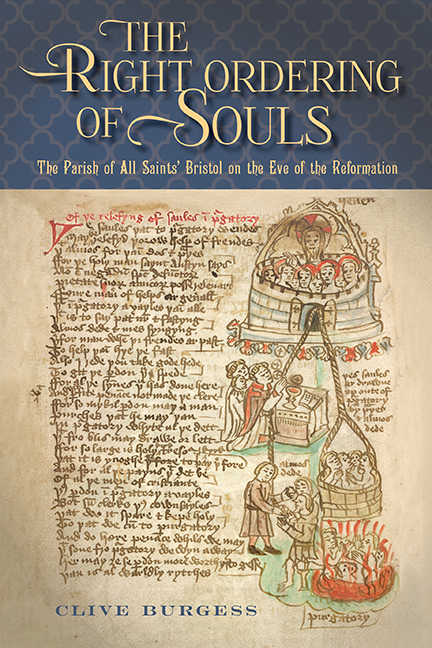Book contents
- Frontmatter
- Dedication
- Contents
- List of illustrations
- Acknowledgements
- Miscellaneous Frontmatter
- Abbreviations
- Notes
- map
- Part I For the increase of the divine service
- Part II All Saints’, Bristol, and its parishioners
- 2 ‘To be showed and declared’: Circumstances and sources
- 3 ‘According to the usage there’: Reading testamentary evidence
- 4 ‘Since his decease’: The widows’ might
- 5 ‘God amend them’: The parish wronged
- Part III Commemorating the dead
- Part IV Leaders and administrators
- Part V Ordering the parish
- Appendices
- Bibliography
- Glossary
- Index
- Miscellaneous Endmatter
5 - ‘God amend them’: The parish wronged
from Part II - All Saints’, Bristol, and its parishioners
Published online by Cambridge University Press: 05 May 2018
- Frontmatter
- Dedication
- Contents
- List of illustrations
- Acknowledgements
- Miscellaneous Frontmatter
- Abbreviations
- Notes
- map
- Part I For the increase of the divine service
- Part II All Saints’, Bristol, and its parishioners
- 2 ‘To be showed and declared’: Circumstances and sources
- 3 ‘According to the usage there’: Reading testamentary evidence
- 4 ‘Since his decease’: The widows’ might
- 5 ‘God amend them’: The parish wronged
- Part III Commemorating the dead
- Part IV Leaders and administrators
- Part V Ordering the parish
- Appendices
- Bibliography
- Glossary
- Index
- Miscellaneous Endmatter
Summary
AS with widows, offspring who served as executors often acted generously. One such was Richard Haddon who, in the middle decades of the fifteenth century, provided for the souls of his parents, John and Christine Haddon, with remarkable liberality. None of the Haddons has a surviving will, so the benefaction list in the All Saints’ Church Book and various parish deeds furnish most of what we know concerning this family – a perspective which, in this case, sheds welcome light on a productive collaboration between parishioners and clergy. But this story has a sting in its tail: where the desire for commemoration ordinarily exercised a constructive influence, in more difficult circumstances, parishioners – both clerical and lay – might put pressure on individuals, or even punish them, by ensuring that intercession be restricted or even withdrawn.
And so without the Grace of God: Calculating obscurity
We focus upon two generations of the Haddon family. The first generation, John Haddon, vintner, and his wife Christine, had died by the time that the story starts to unfold in the early 1440s. Our protagonist is their son, Richard, also a vintner, who remained active in All Saints’ until the early 1470s. When working for his parents’ benefit, he regularly acted with his co-executor, John Gyllard, who served as Prior of the Kalendars’ Guild until his death in 1451. Gyllard's contribution demonstrates how serving the Kalendars’ interests worked to the parish's advantage, for Richard Haddon and John Gyllard collaborated closely not only for the benefit of John and Christine Haddon but also to profit All Saints’ as well as the Kalendars.
THE TESTIMONY OF THE BENEFACTION LIST
As noted above, All Saints’ benefaction list survives in two redactions, one compiled c.1480 and the other very early in the sixteenth century; each arranges material under headings, for instance treating clerical donors separately from lay benefactors. John Gyllard surfaces in the first redaction itemising the clergy's contribution. On his own account, he clearly sought the profit of his host parish. He embellished liturgical celebration within the church by donating both a paxbread of silver, said to weigh 9. oz., and a pair of processionals; he also improved parish fittings by commissioning what are referred to as ‘the four seats in the Cross aisle’ at a cost of £3.
- Type
- Chapter
- Information
- 'The Right Ordering of Souls'The Parish of All Saints’ Bristol on the Eve of the Reformation, pp. 163 - 190Publisher: Boydell & BrewerPrint publication year: 2018

